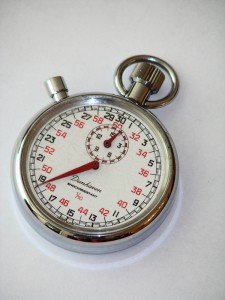Physicians believe that:
Anyone who delivers care in less time than me must be cutting corners and providing low quality care. Same goes for clinics, hospitals, emergency departments…
Do physicians believe, then, that taking longer would improve quality? Does more time equal more quality?
Deep down, many physicians believe that:
The highest quality care happens at precisely the speed at which I provide it, or could provide it, if I chose to work at my top speed.
This could just be physicians resisting change for their own reasons. But I think there’s more…
Outcomes & Quality in Healthcare
Patients believe compassion equals quality, and rightly so: quality care must be compassionate.
But patients also want great outcomes.
Time determines outcome for most EM care (ICES Quality Report, 22 of 48 indicators are time based).
Many papers show ways to decrease waste for patients: see articles on LEAN and time in emergency care.
EM associations teach ways to increase speed without decreasing quality (Physician Efficiency, Canadian Journal of Emergency Medicine; Doing Things Faster Without Sacrificing Quality, ACEP), and many report ways to speed up care (Speed it up from Stanford 2013; ERs Move to Speed Care, WSJ 2011).
Time equals quality in emergency care. There is no evidence that patient waiting or taking-a-long-time-to-provide-care equals quality.
Humility can help to improve performance. Are we willing to look for ways to improve based on others’ success?


Time indeed does equal quality but quality is also preventing bouncebacks, quality is also good documentation, quality is also getting the diagnosis right, quality is also providing good discharge instructions, quality is also good communication.. It also serves physician financial interests to be quick and efficient as they can bill more and see more patients. But, are there enough physician incentives for the other quality of care indicators? Are those same physicians who advocate for physician efficiency and reduced wait-times also measuring bouncebacks, diagnostic accuracy, patient discharge instructions, patient communication satisfaction and patient outcomes. Those physicians are the true quality of care advocates. But, those who are “very efficient only” and their contribution to the other indicators only minimal or nil, we must question their true driver as they speak of “quality of care”.
Great comment, Scotty! You know how much I love hearing from you.
I agree that outcomes such as bounce-backs and diagnostic accuracy are core aspects of quality. We need to measure outcomes and show how we improve outcomes for patients.
While I agree that documentation is a good thing, I do not see it as an outcome that patients would value; would pay to have more of. I think documentation serves mostly to protect me from lawsuit. There are rare times when knowing what medication was given last time becomes crucial, but even then, I usually have trouble figuring out what was written regardless of how complete the last MD’s documentation.
As for education and communication, we could ask whether patients learned and understood more after listening to a physician that took 10 minutes to discuss a diagnosis compared with one who took only 2 minutes to do so clearly.
Finally, I agree that financial incentive can make some behave such that they don’t even perform the bare minimum and outcomes suffer. These folks get attention from their terrible results and complaints.
Even in a purely salaried setting, physicians work at different speeds. Some can communicate clearly in a way patients understand and appreciate in ¼ the time another doc takes. Some have figured out how to remove all unnecessary detail from documentation and investigation. After many years of thinking I was one of the more efficient guys, I still have much to learn.
Again, thanks for a great discussion! I think outcomes offer the only way to measure whether someone offered quality care, and we need to measure them more and more!
Cheers
Shawn